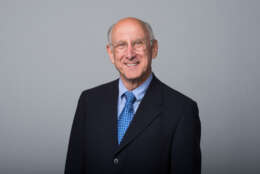Management
-
The Internal Revenue Service has lost about 10 percent of its budget since 2010. The result of that -- according to the Treasury Inspector General for Tax Administration -- is that the IRS can't collect as much tax money as it should be collecting. Don Kettl is a professor at University of Maryland's School of Public Policy. He tells In Depth with Francis Rose that tax collectors have been unpopular for a long time.
July 07, 2015 -
When it comes to innovating the procurement process, the Department of Homeland Security is trying to become more risk-friendly through a new lab.
July 07, 2015 -
The Smithsonian's National Air and Space Museum may be the second most popular museum in Washington. But's its falling apart. The museum has unveiled a comprehensive renovation plan to coincide with its 40th anniversary next year. When it's finished, it'll feature new digital displays and an integrated mobile experience. Claire Brown is the director of communications at the Air and Space Museum. She joined Tom Temin on the Federal Drive with more on the renovations.
July 07, 2015 -
Tyler Morris, director of product management for Iron Mountain Government Services, makes the case that better information security is attainable by establishing an information governance strategy.
July 07, 2015 -
As more and more agencies hire chief data officers, the question arises, what’s the difference between data and information? And where does the chief information officer fit into the discussion? In the first part of our special report, Deconstructing the CDO, federal CIOs and CDOs agree there is room for both as agencies mature their use and understanding of data.
July 07, 2015 -
Thirty-nine out of 41 of the Veterans Affairs Department's outpatient leasing projects -- worth about $2.5 billion -- are running behind schedule. Delays range anywhere between six months to 13 years. Most of the delays happened before the VA began the lease agreement because the Veterans Health Administration didn't detail the project's requirements on time. Dave Wise is a director of physical infrastructure issues at the Government Accountability Office. He testified recently before the House Oversight and Government Reform Subcommittee on National Security. He tells In Depth with Francis Rose the reason behind most of the delays and where in the leasing process things started to slow down.
July 06, 2015 -
Sen. Jon Tester (D-Mont.) wants the Office of Personnel Management's inspector general to investigate the full-suite of systems OPM uses to store personal background investigation information.
July 06, 2015 -
The Base Realignment and Closure controversy doesn't look different than it has the last few Congresses. The Defense Department wants another round of BRAC -- Congress says absolutely not. In this week's edition of Inside the DoD reporter's notebook, Jared Serbu writes about a group that you wouldn't expect would want another round of BRAC.
July 06, 2015 -
The Commerce Department is recovering from years of disjointed procurement oversight and spending. Commerce finds millions of dollars in procurement efficiencies thanks to an effort to improve the acquisition process that's been going on for several years. Barry Berkowitz is the senior procurement executive at the Commerce Department. He tells Federal News Radio Executive Editor Jason Miller how he is transforming the agency and why his efforts are similar to what other chief acquisition officers say they are trying to do in a Federal News Radio survey of CAOs.
July 06, 2015 -
The government’s latest budget playbook, the Circular A-11, for the first time includes a specific mention of climate-smart buildings.
July 06, 2015 -
The law enforcement response to what turned out to have been a false alarm at the Washington Navy Yard last week was quite different than the actual active shooter situation in 2013.
July 06, 2015 -
The Association of Defense Communities recently surveyed its membership, asking whether they’d prefer another BRAC round to the current hand-wringing about when or if the military will realign its stateside infrastructure. 91 percent said they’d prefer another BRAC, while 8.6 percent prefer the status quo.
July 06, 2015 -
Federal News Radio’s fourth annual survey of chief acquisition officers and senior procurement executives found training, recruitment and retaining acquisition workers continues to be their highest priority. But the survey found CAOs believe finding efficiencies in their contracts is becoming more important. Commerce's Barry Berkowitz said his agency’s spend analysis showed possible consolidation and reduction opportunities in $800 million in procurement spending.
July 05, 2015 -
Dr. Steven Rosenberg believed in the viability of immunotherapy as an effective treatment for cancer when few others would.
July 03, 2015 -
In the 1970s most people in the medical community didn't believe it was possible to use a patient's own body to attack cancer cells and slow tumor growth. Dr. Steven Rosenberg did and advanced the field of immunotherapy. Dr. Rosenberg is chief of the surgery branch of the National Cancer Institute and a finalist for a Service to America Medal in the career achievement category. He tells In Depth with Francis Rose how immunotherapy works and how its changing how doctors treat cancer.
July 03, 2015







